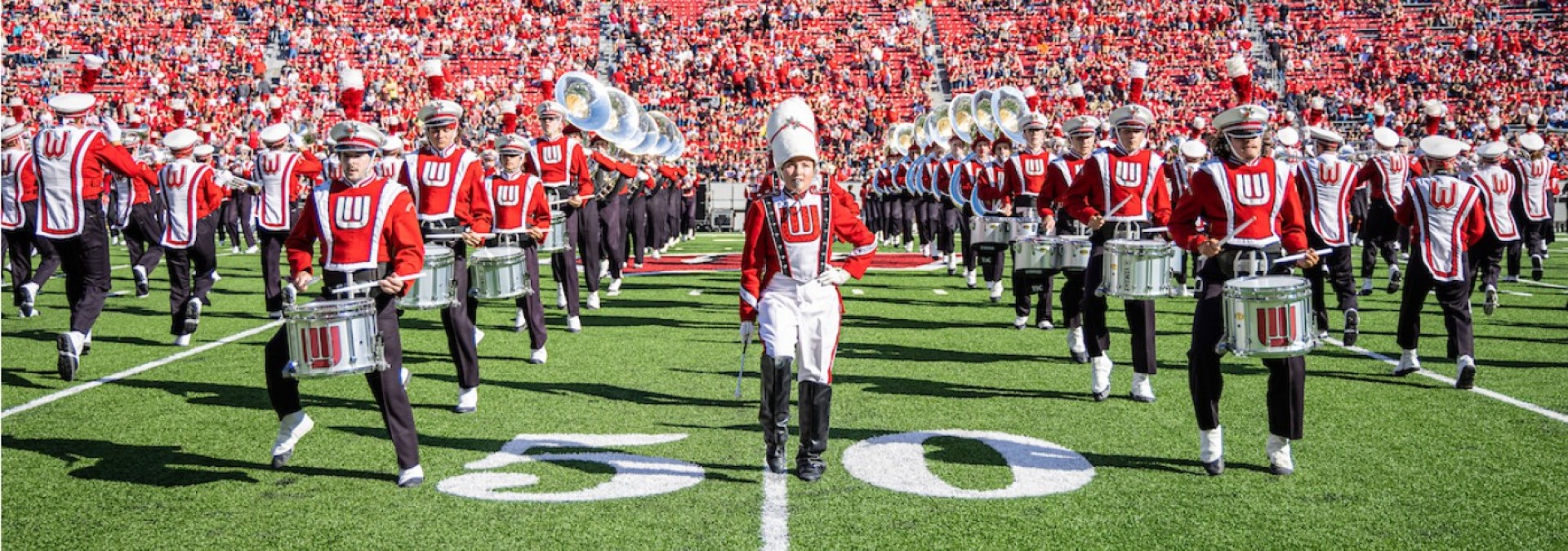×
Glossary
Athletic Band Director: A band director employed and funded by a college or university's athletic department, typically responsible for bands that perform at sports events.
Auxiliary Performers: Non-instrumental members of the marching band who add visual elements, such as flag spinners, dancers, or baton twirlers.
Audition: A tryout where students demonstrate their musical or performance skills to be selected for the marching band (or a specific role within it).
Band Camp: A multi-day training period held before the school year begins where marching band members learn music, drill (movement), and team-building skills.
Baton Twirlers: Performers who twirl batons (metal sticks) in choreographed routines, often part of the auxiliary or feature team in a marching band.
Color Guard: A group that performs choreographed flag, rifle, or sabre routines to enhance the visual impact of the marching band performance.
Community Parades: Public events where marching bands perform while walking along a parade route, often for holidays or civic celebrations.
Drum Major: The student leader of the marching band, responsible for conducting the band during performances and leading practices or parades.
Financial Perks: Benefits that reduce the cost of college participation, such as free game admission, travel, or meals, even if not part of a direct scholarship.
Home Games: Football games played on the college or university's own campus stadium.
Instrumentalists: Musicians who play band instruments like trumpet, clarinet, flute, saxophone, or percussion in the marching band.
Leadership Role: A position of responsibility within the band, such as drum major, section leader, or head of a performance group (e.g., color guard captain).
Lottery (Ticket Lottery): A system where limited tickets (especially discounted student tickets) are randomly distributed to students who enter a drawing or waitlist.
Marching Band: A group of student musicians who perform music while marching in formation, typically at football games and community events.
Music Department: The division of a college or university responsible for music education and faculty, often overseeing music majors, ensembles, and recitals.
Playoff Game: A high-stakes postseason football game, where marching bands may perform at more prestigious and crowded events.
PR (Public Relations) Department: A division of a college that manages the school's image and outreach, sometimes sharing funding responsibilities for bands due to their public presence.
Scholarship: A financial award given to students to help pay for college, often based on talent, need, or participation in programs like marching band.
Section Leader: A student responsible for leading a specific section of the band (e.g., trumpets, percussion) in rehearsals and performances.
Senior Band Day: A special event where high school seniors are invited to visit a college campus, rehearse with the marching band, and explore scholarship opportunities.
Shared Budgets: Funding for the marching band that comes from more than one college department, such as music, athletics, or public relations.
Stipend: A small, regular payment given to band members to offset expenses—often weekly during performance seasons.
Student Ticket: A discounted football game ticket available to enrolled college students, usually limited in number and offered through a lottery.
Visibility: The level of public exposure or attention a marching band receives, often used to justify larger scholarships in high-profile programs.


.png) ARTICLE GLOSSARY
ARTICLE GLOSSARY

.png)
.png)


.jpg)
.jpg)

.jpg)

.png)




.jpg)
.png)










.jpg)



.jpg)
.jpg)
.jpg)
.jpg)
.jpg)

.png)
.png)

